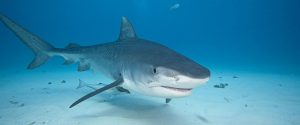DNA Lets Sharks Take a Bite Out of Cancer–Evolution or Creation?

Are humans really higher on the “evolutionary chain” than sharks? USA Today published an article on January 30, 2017 entitled: “Could sharks be the key to solving human cancer?”
A new study of shark DNA shows that unique evolutionary changes in immunity genes may explain how sharks’ open wounds heal so fast and why the ocean’s top predator rarely gets cancer.
But, scientist warn, simply eating shark meat or other parts won’t help humans battle cancer. In fact, eating sharks could be detrimental to human health because of high levels of mercury found in these “apex predators.”
Research scientists at Nova Southeastern University and Cornell University probed the genetics of great white and great hammerhead sharks to learn why shark wounds heal rapidly and why sharks are so resistant to cancer.
Research scientists at Nova Southeastern University and Cornell University probed the genetics of great white and great hammerhead sharks to learn why shark wounds heal rapidly and why sharks are so resistant to cancer.
Immune systems, fine-tuned over 400 million years of evolution, heal open wounds on sharks and rays within hours. Scientists suspect this amazing ability also may help sharks and rays fend off cancer.
A study, recently published in the journal BMC Genomics, provides the first evidence that some shark and ray immunity genes have undergone evolutionary changes possibly tied to these novel immune system abilities, the researchers said.
“The immune system of sharks and rays has been battle-tested and evolved over hundreds of millions of years,” said Mahmood Shivji, director of NSU’s Save Our Seas Shark Research Center and Guy Harvey Research Institute in Fort Lauderdale.
“Using genomics approaches to understanding their immunity genesis is likely to produce many more exciting discoveries, some of which could potentially translate into human medical benefit,” Shivji said.
Within hours of a shark suffering a wound, a coating of cells begins to grow over the wound, faster than anything that mammals can do.
Two shark genes especially stood out, the researchers said. Both genes have counterparts in humans, where their overexpression is linked with cancers. But in sharks, natural selection has modified the two genes into tumor preventives.
One gene codes for a protein that in humans helps inhibit an essential natural process called “programmed cell death.”
“At certain times, some cells have to stop dividing and die. That’s a good thing,” Shivji said. But overexpression of the gene inhibits normal programmed cell death, setting the stage for cancer.
Research has shown that compounds from shark tissues can inhibit growth of new blood vessels on tumors.
“Several studies have demonstrated anti-tumor properties of shark-derived compounds in lab studies, said Shivji, who co-led this research with Michael Stanhope, a Cornell scientist. “It’s intriguing that we are now seeing evidence of evolutionary adaptation in these specific shark immunity genes, which just happen also to be involved in promoting cancer in humans.”
The theory of shark and ray cancer resistance needs rigorous scientific confirmation, the researchers said. But their study raises the hopeful possibility that proteins produced by these cancer-related genes protect the animals from getting cancer and could have applications for human medicine.
Scientists say they’ve only scratched the tip of the genetic iceberg of sharks. Later this year, Shivji and his colleagues plan to publish the entire genome of the great white shark, which is 1.6 times the human genome. “We’re digging into why. What’s there? Why is it so big?” Shivji said of the great white shark’s genome.
Shivji said their findings highlight the importance of shark conservation.
“Now we have another important reason to make sure we don’t lose these marvelous and ecologically critical animals to overfishing, as is currently occurring in many parts of the world,” he said. “We’ve just scratched the surface in terms of learning what these ancient animals can teach us, as well as possibly provide us in terms of direct biomedical benefits.”
Let’s see now: humans, higher on the evolutionary ladder, get cancer a lot, but sharks, lower on the ladder, rarely get it, which doesn’t fit in with the theory of evolution. Humans should have this ability also, since they’re supposedly higher on the evolutionary chain, but they don’t.
God created all living things so that they reproduce their own kind.
“Then God said, ‘Let the earth produce vegetation: seed-bearing plants and fruit trees on the earth bearing fruit with seed in it according to their kinds.’ And it was so. The earth produced vegetation: seed-bearing plants according to their kinds and trees bearing fruit with seed in it according to their kinds. And God saw that it was good.” (Genesis 1:11-12)
“So God created the large sea-creatures and every living creature that moves and swarms in the water, according to their kinds. He also created every winged bird according to its kind. And God saw that it was good.” (Genesis 1:21)
“Then God said, ‘Let the earth produce living creatures according to their kinds: livestock, creatures that crawl, and the wildlife of the earth according to their kinds.’ And it was so. So God made the wildlife of the earth according to their kinds, the livestock according to their kinds, and creatures that crawl on the ground according to their kinds. And God saw that it was good.” (Genesis 1:24-25)
The facts show that there is no “evolutionary chain” link between sharks and humans. No macro-evolution.